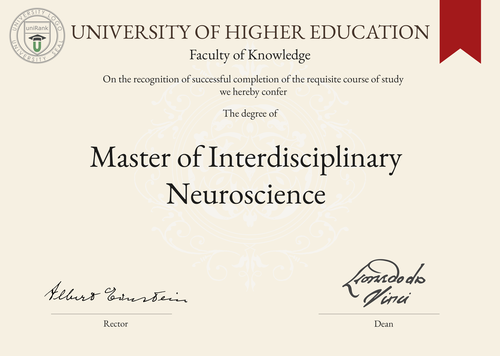
Master of Interdisciplinary Neuroscience (MSc in Neuroscience)
Guide to Master of Interdisciplinary Neuroscience Program/Course/Degree
Master of Interdisciplinary Neuroscience (MSc in Neuroscience)

Program Name
Master of Interdisciplinary NeuroscienceProgram or Degree abbreviation
MSc in NeuroscienceDuration range
1-2 yearsTuition range
Varies by country and university. Please check with specific institutions for accurate information.Overview
The Master of Interdisciplinary Neuroscience program offers students a comprehensive understanding of the field of neuroscience, focusing on the interdisciplinary nature of the subject. This program combines knowledge from various disciplines such as biology, psychology, chemistry and physics to provide a holistic approach to studying the brain and nervous system.Curriculum Overview by year
Year 1: - Introduction to Neuroscience - Neuroanatomy - Cellular and Molecular Neuroscience - Cognitive Neuroscience - Research Methods in Neuroscience Year 2: - Advanced Topics in Neuroscience - Neuroimaging Techniques - Neurophysiology - Neuropharmacology - Thesis or Research ProjectKey Components
- Comprehensive understanding of neuroscience principles - Interdisciplinary approach to studying the brain and nervous system - Hands-on experience with neuroimaging techniques and research methods - In-depth knowledge of neuroanatomy, neurophysiology and neuropharmacology - Opportunity to conduct original research in the field of neuroscienceCareer Prospects
Graduates of the Master of Interdisciplinary Neuroscience program have a wide range of career opportunities. They can pursue careers in research institutions, pharmaceutical companies, healthcare organizations, government agencies and academic institutions. Possible job roles include neuroscientist, research scientist, clinical neurophysiologist, neuropsychologist and pharmaceutical researcher.Salary Expectations
Salary expectations for graduates of the Master of Interdisciplinary Neuroscience program can vary depending on factors such as location, industry and level of experience. On average, neuroscientists earn a median salary of $82,000 per year, but this can range from $50,000 to over $120,000 annually. For a more accurate understanding of salary expectations, you can utilize the Job Sites Search Engine, from our sister site jobRank, which searches over 4,600 job sites worldwide. Make sure to specify not only the job title but also the country you are interested in.Conclusions:
It is important to note that the duration, tuition fees, curriculum, key components, career prospects and salary expectations of the Master of Interdisciplinary Neuroscience program can vary depending on the country or location where you choose to study, as well as the specific university you select. Therefore, it is recommended to research and compare different programs and institutions to find the best fit for your academic and career goals. To explore where this specific degree, the Master of Interdisciplinary Neuroscience, is offered anywhere in the world, you can use the uniRank World Universities Search Engine. This search engine allows you to find universities and programs based on your preferences and criteria, helping you make an informed decision about your education.World Universities Search Engine
search for Master of Interdisciplinary Neuroscience (MSc in Neuroscience) and add the Location (country, state etc.) or specific University you are interested in studying at.
Query examples:
- Master of Interdisciplinary Neuroscience (MSc in Neuroscience) United States
- Master of Interdisciplinary Neuroscience (MSc in Neuroscience) United Kingdom online
- Master of Interdisciplinary Neuroscience (MSc in Neuroscience) Australia international students
- Master of Interdisciplinary Neuroscience (MSc in Neuroscience) University of California
- Master of Interdisciplinary Neuroscience (MSc in Neuroscience) University of London tuition fees
- Master of Interdisciplinary Neuroscience (MSc in Neuroscience) University of Sydney scholarships
Share Program/Course
Interesting? Share this program/course/degree info with your friends now.